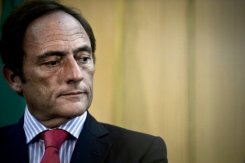
Doubts remain after Portugal deal to avert coalition collapse
(MENAFN- AFP) Doubts swirled in Portugal Sunday over whether a last-minute deal to promote a minister whose resignation sparked a government crisis would be enough to end fears over the country's political stability.
Prime Minister Pedro Passos Coelho on Saturday said ex-foreign minister Paulo Portas, who had stepped down on Tuesday in protest at austerity measures in the bailed-out nation, would become deputy premier in a bid to hold the ruling coalition together.
Portas is also the leader of the junior partner in the coalition, the conservatives CDS-PP, whose fragile alliance with Coelho's Social Democrats is key to the coalition's survival.
Portas's new job will be "coordinating economic policies and relations" with Portugal's "troika" of creditors -- the European Union, European Central Bank and International Monetary Fund, said Passos Coelho.
The re-assignment comes despite Portas having quit over a row over the tough economic policies imposed by the troika on the recession-hit country in exchange for a 78-billion-euro ($100-billion) bailout.
Portuguese media was less than convinced by the reshuffle on Sunday.
"Does the new government deserve the Portuguese people's trust?" asked the daily Publico.
"We can't believe in any of the guarantees given," sociologist Paquete de Oliveira wrote in the Diario de Noticias.
Portugal's opposition, meanwhile, said the deal was not credible.
"The survival of the government is not a solution, it's a nightmare for the Portuguese," said Socialist party chief Antonio Jose Seguro.
"Nobody trusts the government or the word of its leaders any more."
The deal still has to be formally approved by President Anibal Cavaco Silva next week but its agreement, Portugal hopes, will go some way in easing the minds of eurozone finance ministers who are meeting on Monday in Brussels to discuss the crisis.
Ministers worry the political row, which started on Monday with the resignation of finance minister Vitor Gaspar, will delay Portugal's return to the markets next year, when the bailout plan is due for completion.
Some observers said Portas had scored a victory by getting promoted after opposing government policy.
But others said Passos Coelho made the move to avoid calling snap elections ahead of another visit by representatives of the troika on July 15 to assess the state of Portugal's accounts.
Portas is under instructions from the prime minister to "prioritise restarting the economy and jobs", and the daily Publico warned that by accepting his new role Portas "has lost his room for manoeuvre in criticising government policy".
Unemployment in Portugal for this year is forecast at a record 18.2 percent, while experts predict the economy will retract 2.3 percent.
Reporting to Portas will be Treasury Secretary Maria Luis Albuquerque, whose candidacy for finance minister to replace Gaspar the new deputy PM had previously rejected, believing she would pursue grinding economic reforms in defiance of mass protests.
Since 2011, debt-wracked Portugal has implemented a series of painful austerity measures in return for the troika's rescue funds.
The programme of spending cuts and tax increases has won praise from international creditors but has proved hugely unpopular at home, sparking frequent protests and four general strikes.
This week's political crisis sent Portugal's 10-year borrowing rates to critical levels and saw stocks plunge.

Legal Disclaimer:
MENAFN provides the
information “as is” without warranty of any kind. We do not accept
any responsibility or liability for the accuracy, content, images,
videos, licenses, completeness, legality, or reliability of the information
contained in this article. If you have any complaints or copyright
issues related to this article, kindly contact the provider above.

















Comments
No comment